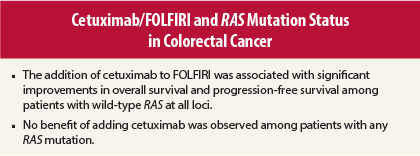The phase III CRYSTAL trial showed that the addition of cetuximab (Erbitux) to first-line FOLFIRI (fluorouracil, leucovorin, and irinotecan) significantly improved overall survival, progression-free survival, and objective response rates in patients with KRAS codon 12/13 (exon 2) wild-type metastatic colorectal cancer.1,2 According to a post hoc analysis conducted in the CRYSTAL population and reported in the Journal of Clinical Oncology, Eric Van Cutsem, MD, PhD, of University Hospitals Gasthuisberg/Leuven, and colleagues found that cetuximab was not of benefit among patients in the trial with RAS mutations at exon 2 or other loci.3
Study Details
In the CRYSTAL trial, patients with epidermal growth factor receptor (EGFR)-expressing metastatic colorectal cancer were randomly assigned to receive 14-day cycles of FOLFIRI plus weekly cetuximab or FOLFIRI alone as first-line treatment. In the current study, DNA samples from CRYSTAL patients with KRAS exon 2 wild-type tumors were reanalyzed for other RAS mutations in four additional KRAS codons (exons 3 and 4) and six NRAS codons (exons 2, 3, and 4) using beads, emulsion, amplification, and magnetics technology; no tissue microdissection was performed.
In total, RAS mutation status was assessable in 430 (65%) of the 666 patients with KRAS exon 2 wild-type tumors, including 210 in the cetuximab/FOLFIRI group and 220 in the FOLFIRI-alone group. Other RAS mutations, using a 5% mutant/wild-type cutoff, were found in 63 (15%) of the 430 patients, including 32 patients in the cetuximab/FOLFIRI group and 31 in the FOLFIRI group.
Outcomes According to RAS Status
Among all 430 RAS-assessable patients with wild-type KRAS exon 2 tumors, median overall survival was 26.1 months with cetuximab/FOLFIRI vs 20.2 months with FOLFIRI alone (hazard ratio [HR] = 0.75, P = .008), median progression-free survival was 11.3 vs 7.7 months (HR = 0.58, P < .001), and objective response rate was 61% vs 38% (P < .001).
Among the 367 patients with wild-type RAS at all loci, overall survival was 28.4 months with cetuximab/FOLFIRI vs 20.2 months with FOLFIRI (hazard ratio [HR] = 0.69, P = .0024), progression-free survival was 11.4 vs 8.4 months (HR = 0.56, P < .001), and objective response rate was 66% vs 39% (P < .001).
Among the 63 patients with RAS mutations, overall survival was 18.2 months with cetuximab/FOLFIRI vs 20.7 months with FOLFIRI (HR = 1.22, P = .50), progression-free survival was 7.2 vs 6.9 months (HR = 0.81, P = .56), and objective response rate was 34% vs 35% (P = .97).
Finally, in a population of 460 patients with any RAS mutation, consisting of the 63 patients with other RAS mutation and 397 previously identified with KRAS exon 2 mutation in the CRYSTAL population, overall survival was 16.4 months with cetuximab/FOLFIRI vs 17.7 months with FOLFIRI (HR = 1.05, P = .64), progression-free survival was 7.4 vs 7.5 months (HR = 1.10, P = .47), and objective response rate was 32% vs 36% (P = .40).
Conclusions
The investigators concluded: “In the first-line treatment of [metastatic colorectal cancer], patients with RAS wild-type tumors derived a significant benefit from the addition of cetuximab to FOLFIRI; patients with RAS tumor mutations did not…. [O]ur study supports the use of FOLFIRI plus cetuximab in patients with RAS wild-type tumors and, on the basis of a lack of observed benefit, suggests the exclusion of patients with other RAS mutations. Reserving such first-line treatment for a RAS wild-type population allows the definition of a subgroup more likely to benefit from the addition of cetuximab to FOLFIRI. Molecular testing of tumors for all activating mutations in KRAS and NRAS before considering anti-EGFR therapy is therefore essential in selecting the most effective treatment for patients with [metastatic colorectal cancer].” ■
Disclosure: The study was supported by Merck KGaA. Dr. Van Cutsem has received research funding from Amgen, Bayer, Boehringer Ingelheim, Eli Lilly, Merck Serono, Novartis, Roche, and sanofi-aventis, all via his institution. For full disclosures of the study authors, visit jco.ascopubs.org.
References
1. Van Cutsem E, Köhne CH, Hitre E, et al: Cetuximab and chemotherapy as initial treatment for metastatic colorectal cancer. N Engl J Med 360:1408-1417, 2009.
2. Van Cutsem E, Köhne CH, Láng I, et al: Cetuximab plus irinotecan, fluorouracil, and leucovorin as first-line treatment for metastatic colorectal cancer: Updated analysis of overall survival according to tumor KRAS and BRAF mutation status. J Clin Oncol 29:2011-2019, 2011.
3. Van Cutsem E, Lenz H-J, Köhne C-H, et al: Fluorouracil, leucovorin, and irinotecan plus cetuximab treatment and RAS mutations in colorectal cancer. J Clin Oncol 33:692-700, 2015.
See commentary by Brandon G. Smaglo, MD.



